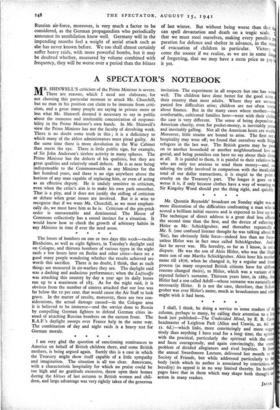A SPECTATOR'S NOTEBOOK
MR. SHINWELL'S criticism of the Prime Minister is severe. There are reasons, which I need not elaborate, for not choosing this particular moment to attack Mr. Churchill, but no man in his position can claim to be immune from criti- cism, and a great many people are saying in private more or less what Mr. Shinwell deemed it necessary to say in public about the immense and intolerable concentration of responsi- bility in the Prime Minister's own hands. In Mr. Shinwell's view the Prime Minister has not the faculty of devolving work. There is no doubt some truth in this ; it is a deficiency to which many of the ablest administrators must plead guilty. At the same time there is more devolution in the War Cabinet than meets the eye. There is little public sign, for example, of Sir John Anderson's tireless activity in many spheres. The Prime Minister has the defects of his qualities, but they are great qualities and relatively small defects. He is as near being indispensable to the Commonwealth as any Minister for the last hundred years, and there is no sign anywhere above the horizon of any man capable of replacing him, or even of acting as an effective deputy. He is unduly sensitive to criticism, even when the critic's aim is to make his own path smoother. That is a pity, and it does not justify the stifling of criticism or debate when great issues are involved. But it is wise to recognise that if we want Mr. Churchill, as we most emphati- cally do, we must have him as he is. Criticism of the pin-prick order is unreasonable and detrimental. The House of Commons collectively has a sound instinct for a situation. It would know how to check the growth of arbitrary habits in any Minister in time if ever the need arose.
* * * *


























 Previous page
Previous page